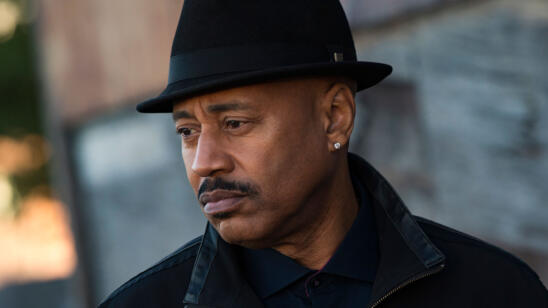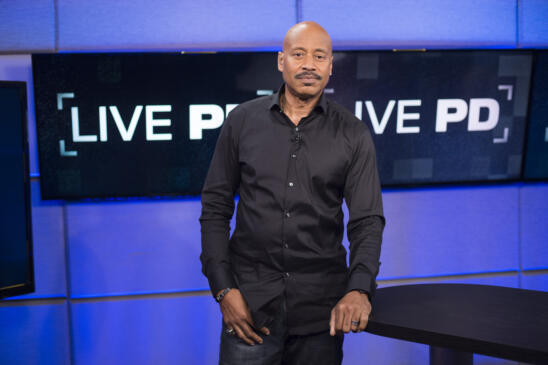True Crime: First off, what’s proper form of address for a trooper. Is it Officer or…?
James Casey: It’s Trooper — but you can call me James. I’m not hung up on titles.
RC: What do think you bring to the table when you do your commentary on Live PD?
Casey: I think I have the understanding of what officers are going through. And then, in the studio, I’m pretty quick-witted. I can just fit in right with them as if I’ve been there all along.
RC: What do you think the show adds to our understanding of law enforcement?
Casey: One thing I think it’s done for myself and the general public is show that we’re all human. We all want to go home to our families, our friends. That’s what I’ve loved about the show — it has put us under scrutiny, but it shows that not only are we working in a stressful environment when calls are going through, but we’ve also got cameras right there with us.
RC: Some law officers say “I’m not a sit-behind-a-desk person. I like going out and chasing down a young guy with a gun…” Does that apply to you?
Casey: What I love about the job is — and it’s a cliché but it is true: You just do not know what you are going to get day to day. That’s the best part of it. A lot times you see on the TV news the accused person is going in to court in a suit and tie and they’re all cleaned up. But they don’t see them when we see them — when they’re combative and fighting and cussing or intoxicated. That’s the element the show really helps bring out.
RC: What was that like to go from being a detective in the Northeast and move to Arizona to be a trooper?
Casey: I grew up in Houston and so I’ve always been a warm-weather guy. The police department that I left, we were like a 100-officer department. And at DPS, the Arizona Department of Public Safety, it’s just a little shy of 1,700 people. So it’s a huge jump.
RC: Did your duties change from when you were a detective?
Casey: Oh, yeah. When I was a detective at the police department, my first big case was a $130,000 bank robbery. Like I said, we were only a 100-officer department, so I’d work murder. I’d work homicide. I’d work sexual assault…And now, with the Department of Public Safety, my work is more focused on traffic enforcement, collisions, fatal collisions, and that kind of stuff. I think having the experience of both helps. It helps me deal with people. If they’re trying to con me on something I can usually see through it.
RC: Is Arizona one of those areas where there are a lot of people passing through doing illicit stuff?
Casey: Because we’re a border state with Mexico — compared to a Northeast police department where we’d wind up stopping a car and getting a half pound of marijuana — in Arizona, you’d stop a car and it could be a Chevy Suburban that they’ve torn all the seats out of, and you could get 500 pounds of pot. It’s night and day.
RC: You had this terrible incident when the guy shot you—how hard was it to go back?
Casey: It wasn’t hard for me at all. I had always said that if I could — as long as I didn’t lose my eyesight, my mental ability, and ability to do the job — I’d go back. There was no way I was going to let the guy that shot me beat me. So, I was going to get back and I did. I was out about a year and a half.
RC: What would you say to a younger person just going into law enforcement?
Casey: I always tell them, whether it is a traffic stop or a domestic, the hardest thing is you have to be able to listen and you have to be able to talk to people. I know sometimes younger officers tend to be a bit more aggressive. And I tell them: Just slow down and listen to what these people say. Because sometimes they could be just having a bad day and want to vent. But on the safety side of it, I always tell them: watch the person’s hands. That night I got shot I was so focused on identifying that suspect, because he gave me a false name, that I lost track of his right hand. And that’s where he shot me. Those are the two things I always tell them.
RC: Having been shot and come back, does this give you a special ability to talk to those starting out?
Casey: I guess it is a miraculous thing that I did survive. It was a .357 Magnum. I mean, it was a powerful handgun. And I got shot in the left cheek. I encourage people to ask questions. It’s therapeutic for me to speak. I want them to learn: One) about it and Two) for them to realize that it can be a dangerous job and you just never know. I mean it was a simple traffic stop for an equipment violation—the window was tinted too dark…
RC: For people not in military or law it’s hard to relate to that sense of danger-on-the-job every day. Do you have any hobbies to wind down?
Casey: I go to the gym. My wife and I go to the movies, but I pick the movies. She’ll drag me into 50 Shades, but, me, I like Liam Neeson-type movies that are action, suspense. I just watched Taken…Now that I think about it, I have to come up with something like Liam Neeson’s speech (“I have a certain set of skills…”) for next time I talk to the Academy.
AE: Do you have kids? What would you say to them if they wanted to go into law enforcement?
Casey: I have two boys — Cameron is graduating from high school this year and my youngest, Brandon, is going to be a freshman in high school. My oldest son, he always wanted to be a cop like me growing up. But when I got shot, he didn’t anymore. But now since the show has been on and he’s watched me on it, he’s got a interest in it again. I think it’d be great if he did it.
RC: Do you read any detective novels?
Casey: You want to hear a cool story? I read a book called Victim: The Other Side of Murder by Gary Kinder. It was about a stereo robbery in Ogden, Utah, in 1974. Well, to make a long story short, one of the victims got shot in the head. And to remain conscious, he said his multiplication tables. But when I got shot, I just couldn’t think numbers. So, when I was laying there being prepped to go to the Emergency Room, all I could see was a family member’s face and mentally I would say their name. When I got out of the hospital, I wrote that author and I told him that I used that. He actually wrote me back and said, ‘Wow it’s very inspirational. I’ll use that story when I talk about the book.’
RC: Do you watch crime shows?
Casey: I love The First 48. I also like [Beyond] Scared Straight and 60 Days In. A lot of times I work during those hours so I don’t get to watch them.
RC: Do you have any heroes?
Casey: You know what, I’d say my parents. What they taught me was a work ethic, to do the best you can. My father coached us in Little League and football. He always said to work hard, nothing comes easy. My mother—she always worked hard for us, too.
RC: What do you think is biggest problem, from a law enforcement point of view, in your community or even in the nation?
For me, on the job, that would be drugs. And I’m not talking about marijuana. I’m talking cocaine, methamphetamine, and heroin. I don’t usually arrest people for marijuana — unless it’s a large amount, don’t get me wrong! My rationale for that is: One, as a former city cop, I don’t think I ever went to a domestic call where they had been smoking marijuana. It was usually alcohol-fueled violence or drugs. And the other thing, people who are on cocaine, meth, heroin — they’re breaking into our houses and cars and stealing things. That’s the scourge I see on the streets night in and night out. And I see the toll it takes on a person. Some of these young men and women that I arrest, I’ll look at their license picture and then I’ll look at them, and they don’t even look like the same person anymore. And they’re only three years removed from that picture. It’s sad. And when it comes to the problem of overdosing on heroin, a month or so ago on Live PD I actually saved a guy’s life who was overdosing on heroin. He had no pulse and wasn’t breathing when I rolled up on him. He was on a bench and he just fell over. And some people flagged me down and said they thought the guy was dead. I walked over to him — no pulse. He wasn’t breathing. I started chest compressions and CPR. And he started to groan, so I knew I had an airway. Then the Fire Department showed up and they got him with Narcan and it snapped him right out of it.
A&E’s True Crime gets closer to the people and the stories behind the crime headlines.
(Image: The Arizona Department of Public Safety)


